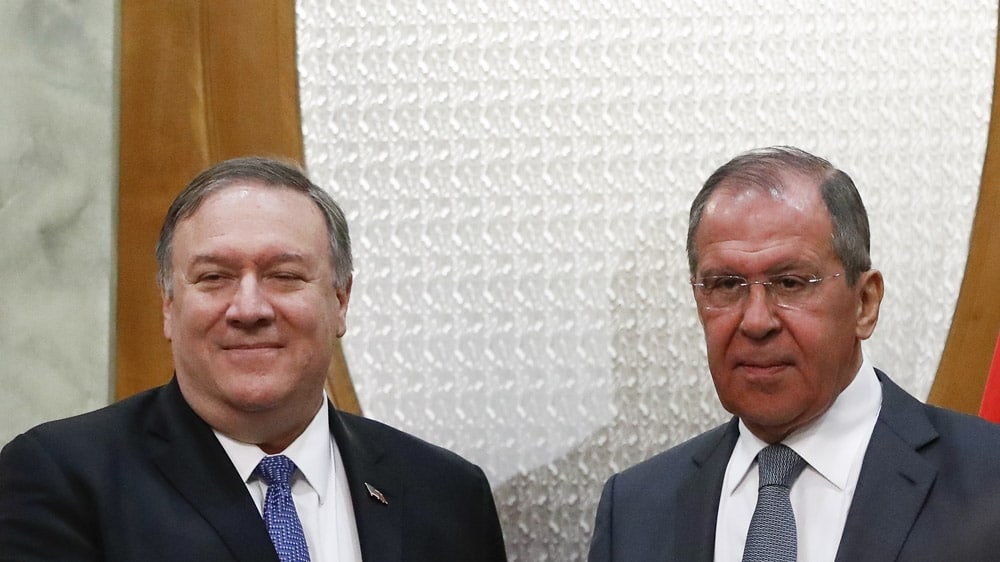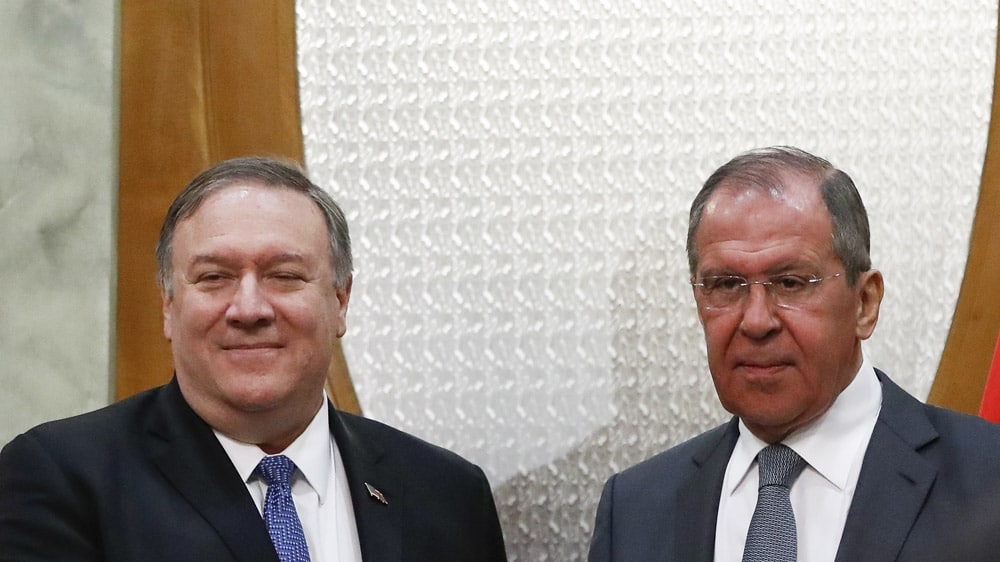On Tuesday Russia’s President Putin again rejected US claims that his country interfered in the 2016 elections in the United States. Additional statements by Foreign Minister Lavrov provide that there is more information available about alleged Russian cyber issue during the election. He pointed to exchanges between the Russian and US governments that Russia wants published but which the US is withholding.
On Tuesday May 14 Secretary of State Mike Pompeo flew to Sochi to meet with Russia’s Foreign Minister Sergej Lavrov and with the President of the Russian Federation Vladimir Putin. It was Pompeo’s first official visit to Russia. Pompeo’s meeting with Lavrov was followed by a joined news conference. The statements from both sides touched on the election issue.
The State Department published a full transcript and video of the press conference in English language. The Russian Foreign Ministry provided an official English translation of only Lavrov’s part. Both translations differ only slightly.
Here are the relevant excerpts from the opening statements with regard to cyber issues.
Lavrov:
We agreed on the importance of restoring communications channels that have been suspended lately, which was due in no small part to the groundless accusations against Russia of trying to meddle in the US election. These allegations went as far as to suggest that we colluded in some way with high-ranking officials from the current US administration. It is clear that allegations of this kind are completely false. […] I think that there is a fundamental understanding on this matter as discussed by our presidents during their meeting last year in Helsinki, as well as during a number of telephone conversations. So far these understandings have not been fully implemented.
Pompeo:
[W]e spoke, too, about the question of interference in our domestic affairs. I conveyed that there are things that Russia can do to demonstrate that these types of activities are a thing of the past and I hope that Russia will take advantage of those opportunities.
During the Q & A Shaun Tanron of AFP asked Pompeo about the election issue:
[I]f I could follow up on your statement about the election, you said that there are things that Russia could do to show that election interference is a thing of the past. What are those things? What do – what would you like Russia to do? Thank you very much.
Lavrov responded first to the question. He said that there is no evidence that shows any Russian interference in the US elections. He continued:
Speaking about the most recent US presidential campaign in particular, we have had in place an information exchange channel about potential unintended risks arising in cyberspace since 2013. From October 2016 (when the US Democratic Administration first raised this issue) until January 2017 (before Donald Trump’s inauguration), this channel was used to handle requests and responses. Not so long ago, when the attacks on Russia in connection with the alleged interference in the elections reached their high point, we proposed publishing this exchange of messages between these two entities, which engage in staving off cyberspace incidents. I reminded Mr Pompeo about this today. The administration, now led by President Trump, refused to do so. I’m not sure who was behind this decision, but the idea to publish this data was blocked by the United States. However, we believe that publishing it would remove many currently circulating fabrications. Of course, we will not unilaterally make these exchanges public, but I would still like to make this fact known.
The communication channel about cyber issues did indeed exist. In June 2013 the Presidents of the United States and Russia issued a Joint Statement about “Information and Communications Technologies (ICTs)”. The parties agreed to establishing communication channels between each other computer emergency response teams, to use the direct communication link of the Nuclear Risk Reduction Centers for cyber issue exchanges, and to have direct communication links between high-level officials in the White House and Kremlin for such matter. A Fact Sheet published by the Obama White House detailed the implementation of these three channels.
One inference from Lavrov’s statement is that the “fundamental understanding on this matter” between the two presidents that has “not been fully implemented” is the release of the communications about cyberspace incidents. The Russians clearly think that a release of the communications with the Obama administration would exculpate them. That would also exculpate Trump from any further collusion allegations. Why then does the Trump administration reject the release? Who is blocking it?
Pompeo did not respond to Lavrov’s points. His next meeting that day was with President Putin.
Putin let him wait for three hours. Both sides issued short opening statements. The English translations of what Putin said differ. In the version provided by Russia Putin explicitely denies the alleged election interference:
For our part, we have said many times that we would also like to restore relations on a full scale. I hope that the necessary conditions for this are being created now since, despite the exotic character of Mr Mueller’s work, he should be given credit for conducting what is generally an objective inquiry. He reaffirmed the lack of any trace or collusion between Russia and the current administration, which we described as sheer nonsense from the very start. There was no, nor could there be any interference on our part in the US election at the government level. Nevertheless, regrettably, these allegations have served as a reason for the deterioration of our interstate ties.
The State Department version does not include the Russian denial of election interference but doubles the rejection of the collusion claim:
On our behalf, we have said it multiple times that we also would like to rebuild fully fledged relations, and I hope that right now a conducive environment is being built for that, because, though, however exotic the work of Special Counsel Mueller was, I have to say that on the whole he had a very objective investigation and he confirmed that there are no traces whatsoever of collusion between Russia and the incumbent administration, which we’ve said was absolutely fake. As we’ve said before, there was no collusion from our government officials and it could not be there. Still, that was – that was one of the reasons certainly breaking our (inaudible) ties.
An English language live translation of that paragraph (vid) by the Russian sponsored Ruptly does not include the word ‘election’ in the highlighted sentence, nor does a live translation (vid) by PBS.
It seem that the Kremlin later inserted the explicit denial of election interference into Putin’s statement. It is quite possible that Putin, who did not read from a prepared paper, mangled the talking point that Lavrov had already made.
After the meeting Putin, Pompeo held a short press availability with the US journalists accompanying him. There is no mentioning of Lavrov’s point.
There were secret communications between the Obama administration and the Russian government about the alleged election interference and ‘hacks’ of the DNC and of Clinton’s campaign manager Podesta. They are not mentioned in the Mueller report nor in any other open source. As Russia wants these communications released it might be possible to file a Freedom of Information Act (FOIA) request to press for their publication. The Trump administration response to such a FOIA request could at least reveal the reasons why it is withholding them.
The allegations of Russian interference in the 2016 elections are partly based on the fact that a commercial Russian enterprise used fake characters on Facebook to sell advertisement. A review of the themes and ideological positions those fake characters provided demonstrates that they were not designed to influence the US elections.
In contrast to those Russian fakes other fake characters on Facebook, provided by an Israeli company and revealed today, were clearly designed to influence elections:
Facebook said Thursday it banned an Israeli company that ran an influence campaign aimed at disrupting elections in various countries and has canceled dozens of accounts engaged in spreading disinformation.
…
Many were linked to the Archimedes Group, a Tel Aviv-based political consulting and lobbying firm that boasts of its social media skills and ability to “change reality.”
…
On its website, Archimedes presents itself as a consulting firm involved in campaigns for presidential elections.Little information is available beyond its slogan, which is “winning campaigns worldwide,” and a vague blurb about the group’s “mass social media management” software, which it said enabled the operation of an “unlimited” number of online accounts.
Don’t expect any protest from Washington DC about such obvious election interference in other countries.
—
Hat tip to Aaron Maté for pointing out Lavrov’s statement
Reprinted with permission from MoonOfAlabama.


